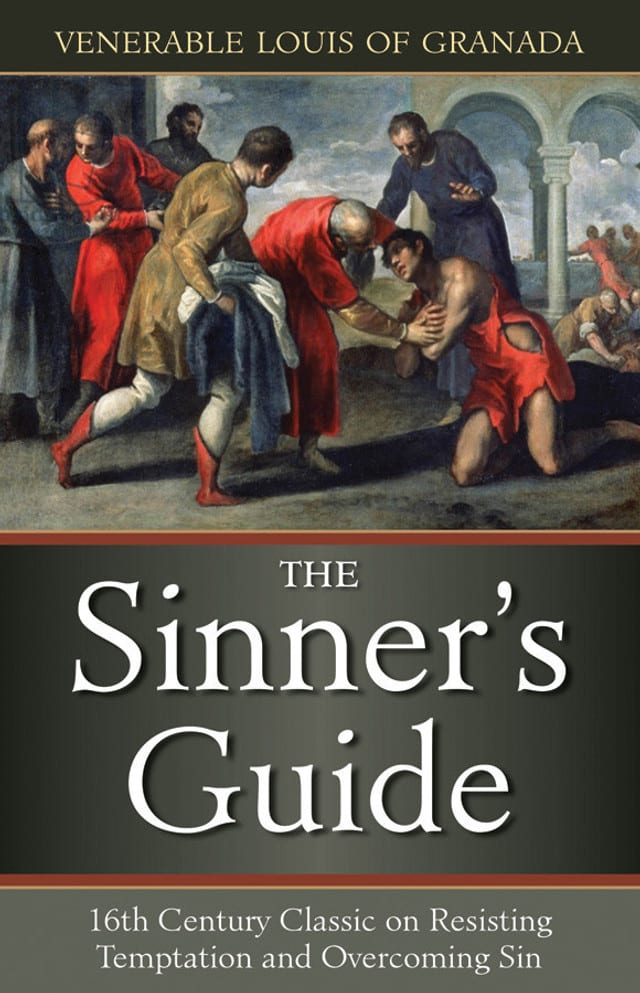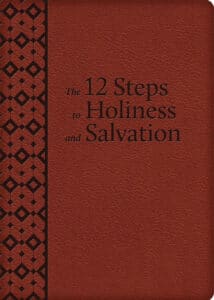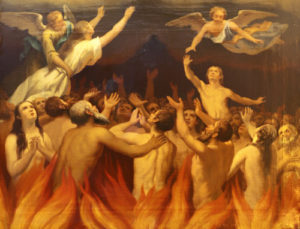The Devastating Consequences of Venial Sin
***Please speak to your priest or spiritual advisor for clarification or personal situations.***
My dear brothers and sisters, some of us have grown very careless when it comes to venial sin. We strive to remain free from mortal sin or we confess it at the first opportunity, but we are casual about venial sin.
Why? Because venial sin does not separate us from God.
And thus, we go about our lives without realizing the consequences of venial sin.
What is venial sin?
The Catechism of the Catholic Church defines venial sin by comparing it to mortal sin:
“Mortal sin destroys charity in the heart of man by a grave violation of God’s law; it turns man away from God, who is his ultimate end and his beatitude, by preferring an inferior good to him.”
Venial sin allows charity to subsist, even though it offends and wounds it.
Catechism of the Catholic Church
Another way I’ve heard the difference between mortal and venial sins described, is that it does not SEVER the relationship with God, but it injures it.
The Consequences of Venial Sin
“Venial sin is the failure to do a good that could and ought to be done; it is, therefore,
Spiritual Theology By Fr Jordan Aumann, OP
the privation of a good and for that reason it is an evil, since evil is by definition the
privation of good.”
Calling venial sin evil might seem to be an exaggeration, but it really isn’t. The effect on our personal sanctity is incremental.
Think of it this way. Imagine, you have a cup of tea in your bedroom and after you are done, you don’t immediately take it to the kitchen, but instead deposit it on your nightstand. No big deal right? What if you forget about it then go and get a glass of water which you then bring back to the room. After you’re done, you deposit that glass next to your cup. You then go and get your self a snicker bar and a bowl of cereal and deposit it on the dresser since you have no more room on the nightstand. What started out as no big deal becomes a big pile of mess, doesn’t it?
In case all of you are neat freaks and can’t relate to the example above, here is another example from a sermon of the late Archbishop Cardinal Henry Edward Manning:
We are, in fact, like soldiers in warfare: wounded, and spotted and spattered by the blood of the conflict. We are laborers out in the field, and the soils and stains of our toil cleave to us. We are wayfarers in the road, and the dust settles upon us even when we do not know it. We cannot go out of the world and the world’s evil. We are in contact with it, and it casts more than its shadow upon us. It casts its stain, and the stain abides (Tanquerey). .
The Twelve Steps to Holiness & Salvation
(Use coupon code BSA for 15% off select TAN Books titles)
The last example is this. Venial sin is like one drop of ink that is dropped into a glass of clear water. Just a little ink is enough to muck things up.
It is the same thing with venial sin.
The following passage is from Spiritual Theology By Fr Jordan Aumann, OP.
The Four Effects of Venial Sin In This Life & Other Effects in the Life to Come
1) It deprives us of many actual graces which God would otherwise have given us.
This privation sometimes results in our falling into a temptation which we could have avoided by means of that actual grace of which we were deprived. At other times it may result in the loss of a new advance in the spiritual life. It likewise results in a lessening of the degree of glory which we would have attained through resistance to that temptation or through the increase in grace. Only in the light of eternity—and then there is no remedy—shall we realize what we have lost as a result of deliberate venial sins.
2) It lessens the fervor of charity and one’s generosity in the service of God.
This fervor and generosity presuppose a sincere desire for perfection and a constant striving for it, which are totally incompatible with voluntary venial sin, because the latter implies a rejection of that lofty ideal and a deliberate halt in the struggle for greater holiness.
3) It increases the difficulties in the exercise of virtue.
This is a result of the two previous effects. Deprived of many actual graces which are necessary to keep us on the path of the good and having lost a good part of its fervour and generosity in the service of God, the soul is gradually weakened and loses more and more of its spiritual energy. Virtue appears to be more difficult, the effort required for growing in holiness becomes more and more demanding, the experience of past failures for which we ourselves are responsible disheartens the soul, and while the world attracts the soul with its seductions and the devil intensifies his attacks, the soul ultimately abandons the path of perfection and perhaps gives itself without resistance to sin.
(Use coupon code BSA for 15% off select TAN Books titles)

4) It predisposes for mortal sin.
This is clearly testified in Scripture when it is stated that he who wastes the little he has is gradually stripped bare.Experience confirms this proof. The soul seldom falls directly and immediately, however violent the attack of its enemies. Usually, the ultimate fall of a soul has been prepared little by little. The soul has gradually lost ground to the enemy, it has been losing its strength through voluntary imprudence in matters which it considered of little importance, it has been losing the divine inspirations, and little by little it has lowered its defenses until the moment arrives in which the enemy, in one furious assault, conquers the city.
The reason for the sufferings of purgatory is the punishment and purification of the soul.
Every sin, in addition to the fault, carries with it the guilt of punishment which must be satisfied in this life or in the next. The punishment due to mortal sins already pardoned and that of venial sins, whether pardoned or not, not satisfied in this life is satisfied in purgatory. God cannot renounce His justice, and the soul must pay its debt completely before it can be admitted to beatific joy. And the pains which the soul will have to suffer in purgatory for those faults which on earth it considered light and of small importance surpass the greatest pains which one could suffer in this world. St. Thomas says this expressly when he teaches that there are two types of pain in purgatory: the one consists in the delay in the reception of the beatific vision and the other which consists in the torment caused by a material fire. And the smallest amount of either one surpasses the greatest suffering in this world.
The increases of grace, of which the soul is deprived in this life because of venial sins, will have a repercussion in eternity.
The soul in heaven will have a lesser glory than it could have attained had it been more faithful to grace in this life. For that reason, for all eternity it will be giving less glory to God than it could have. The degree of glory is in direct relation to the degree of grace attained in this life… Catholicapologetics.info.
Out of the list of consequences, the ones that concern me the most are the ones that could affect the afterlife! I want to be as close as possible to our Lord in heaven. Don’t you? Why be mediocre?
This book gives some reasons why we might want to skip purgatory altogether.
Hungry Souls: Supernatural Visits, Messages and Warnings from Purgatory
Use coupon code BSA.
Venial sin is insidious
Venial sins creep up on us until we no longer even realize that we are sinning.
Fr. Lallemant said, “The multiplication of venial sins is the destruction of souls, causing the diminution of those divine lights and inspirations, those interior consolations, that fervor and courage, which are needed to resist the assaults of the enemy. Hence follow blindness, weakness, frequent falls, an acquired habit of insensibility of heart; because, when once an affection to these faults is contracted, we sin without feeling that we are sinning” (Tanquery).
The Catechism of the Council of Trent
(Use coupon code BSA for 15% off select TAN Books titles)
Is there a list of venial sins/examples of venial sins?
You’d be hard-pressed to find a list because even venial sins can become mortal depending on the severity and intent. The Catechism of the Catholic Church tells us that for a sin to be mortal, it must meet the following conditions:
- The sin in question must be of a grave matter.
- 2. The sin must be committed with full knowledge of its gravity.
- 3. The sin must be committed with full consent of the will.
Any sin outside of that is probably a venial sin.
Here are some possible venial sins.
- Gossiping (can be mortal)
- “White” lies (calling in sick to work when you are not sick)
- Getting annoyed quickly at your spouse or children
- Sins of ommission
- Not attending to your spiritual life.
- Consistently being late to work or leaving earlier than you should.
- Not attending to your household chores.
- Stealing a cookie from the cookie jar and then lying about it.
Manual for Conquering Deadly Sin
How do we fight venial sin?
Now that we hopefully have a greater appreciation for the effects of venial sin, how do we fight it?
- Develop a true revulsion for venial sin.
- Do a daily examination of conscience which will serve to keep us aware of our venial sins.
- Frequent confession.
But, it’s impossible to be perfect! It’s not sin. It’s an imperfection!
Here I must differentiate between venial sins and imperfections. According to “My Catholic Faith“:
A distinction exists between venial sins and imperfections. Imperfections are faults that arise from ignorance or weakness, not from a bad will.
For instance involuntary distractions in prayer, “white lies” told while telling a story or in exagerations or jokes, bad manners that hurt no one much, are imperfections. We should, however, try to avoid all imperfections, for they are not praiseworthy, are often a cause of irritation to others, and make us accustomed to doing what is not correct.
So then, why don’t we lock arms and embark on a journey together to avoid venial sin as much as possible.
May God bless you in your efforts.
Helpful Books on Sin
- The Sinner’s Guide (Use coupon code BSA for 15% off select TAN Books titles)
- The Catechism of the Catholic Church
- The Catechism of the Council of Trent (Use coupon code BSA for 15% off select TAN Books titles)
- The Imitation of Christ (Use coupon code BSA for 15% off select TAN Books titles)
- Manual for Conquering Deadly Sin (Use coupon code BSA for 15% off select TAN Books titles)
- The Spiritual Combat (Use coupon code BSA for 15% off select TAN Books titles)
- 12 Steps to Holiness & Salvation (paperback) (Use coupon code BSA for 15% off select TAN Books titles)
- 12 Steps to Holiness & Salvation (leatherette) (Use coupon code BSA for 15% off select TAN Books titles)
- The Spiritual Life: A Treatise on Ascetical and Mystical Theology (Use coupon code BSA for 15% off select TAN Books titles)
***This article was originally posted in 2018.
- Quotes from the Seven Last Words of Christ (Bonaventure/Arnold) - March 28, 2025
- 10 St. Albert the Great Quotes to Inspire Lukewarm Souls - November 15, 2024
- 42: Late Have I Loved You by St. Augustine – God Doesn't Give Up On Us! - August 28, 2024













